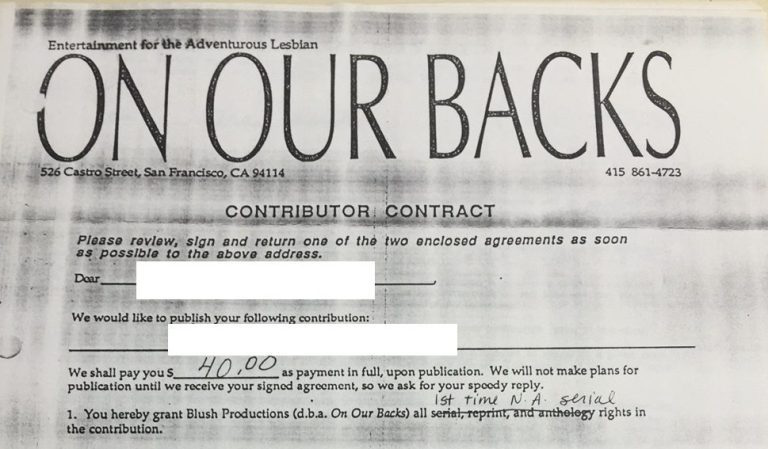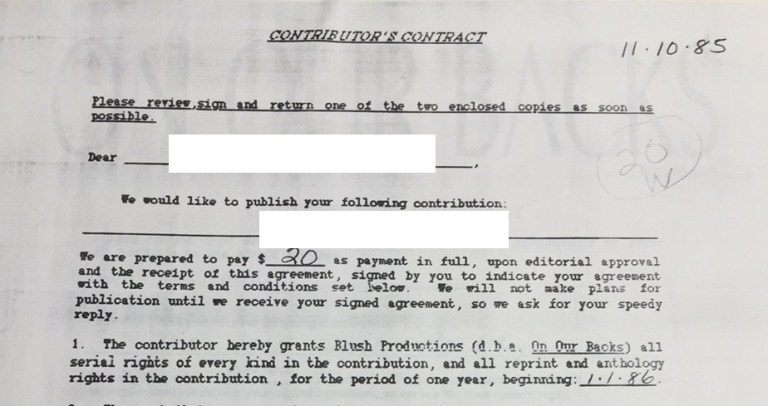In March I wrote a post outlining the ethical issues of Reveal Digital digitizing On Our Backs, a lesbian porn magazine. Last week I spoke at code4lib NYS and shared examples of where libraries have digitized materials where they really shouldn’t have. My slides are online, and here’s a PDF of the slides with notes. Also: Jenna Freedman and I co-hosted a #critlib discussion on digitization ethics.
Susie Bright’s papers in Cornell’s Rare Book and Manuscripts Collection
A couple of weeks before code4lib NYS, I learned that Cornell has Susie Bright’s papers, which include some of the administrative records for On Our Backs. When I was at Cornell I visited the Rare Book and Manuscripts Collection and looked through this amazing collection. The first book of erotica I ever bought was Herotica, edited by Susie Bright, so it was especially amazing to see her papers. It was so exciting to see photo negatives or photos of images that became iconic for lesbians either in On Our Backs, or on the covers of other books. While the wave of nostalgia was fun, the purpose of my visit was to see if the contracts with the contributors were in the administrative papers.
I hit the jackpot when found a thin folder labelled Contributors Agreements. All of them weren’t there, but there were many contracts where the content creators did not sign over all rights to the magazine. Here are three examples.
This contributor contract from 1991 is for “one-time rights only”.
This contributor contract from 1988 is for “1st time N.A. serial rights”. In this context N.A. means North American.
This contributor’s contract from 1985 is “for the period of one year, beginning 1.1.86”.
Copyright and digitizing On Our Backs
Initially I thought that Reveal Digital had proper copyright clearances to put this content online. In addition to the above contributors contract examples, I talked to someone who modeled for On Our Backs (see slides 9 to 11 for model quotes) who said there was an agreement with the editor that the photo shoot would never appear online. These things make me wonder if the perceived current rights holder of this defunct magazine actually had the rights to grant to Reveal Digital to put this content online.
I’m still puzzled by Reveal Digital’s choice for a Creative Commons attribution (CC-BY) license. One of the former models describes how inappropriate this license is, and more worrisome as the lack of her consent in making this content available online.
People can cut up my body and make a collage. My professional and personal life can be high jacked. These are uses I never intended and still don’t want.
Response from Reveal Digital
Last week I spoke with Peggy Glahn, Program Director and part of the leadership team at Reveal Digital. She updated me on some Reveal Digital’s response to my critiques.
Takedown policy and proceedures
Peggy informed me that they had a takedown request and will be redacting some content and with their workflow it takes about 3 weeks to make those changes. She also said that they’ll be posting their takedown policy and process on their website but that there are technical challenges with their digital collections platform. It shouldn’t be difficult to link to a HTML page with the takedown policy, procedures and contact information. I’m not sure why this is a technical challenge. In the meantime, people can email Tech.Support@revealdigital.com with takedown requests. Reveal Digital will “assess each request on a case-by-case basis”.
Not removing this collection
I am really disappointed to hear that Reveal Digital does not have plans to take down this entire collection. Peggy spoke about a need to balance the rights of people accessing this collection and individual people’s right to privacy. It was nice to hear that they recognized that lesbian porn from the 80s and 90s differs from historical newspapers, both in content and in relative age. However by putting both types of collections on the web in the same way it feels like this is a shallow understanding of the differences.
Peggy mentioned that Reveal Digital had consulted the community and made the decision to leave this collection online. I asked who the community was in this case and she answered that the community was the libraries who are funding this initiative. This is an overly narrow definition of community, which is basically the fiscal stakeholders (thanks Christina Harlow for this phrase). If you work at one of these institutions, I’d love to hear what the consultation process looked like.
Community consultation is critical
As this is porn from the lesbian community in the 80s and 90s it is important that these people are consulted about their wishes and desires. Like most communities, I don’t think the lesbian and queer women’s community has ever agreed on anything, but it’s important that this consultation takes place. It’s also important to centre the voices of the queer women whose asses are literally on the page and respect their right to keep this content offline. I don’t have quick or simple solutions on how this can happen, but this is the responsibility that one takes on when you do a digitization project like this.
Learning from the best practices of digitizing traditional knowledge
The smart folks behind the Murkutu project, and Local Contexts (including the Traditional Knowledge labels) are leading the way in digitizing content in culturally appropriate and ethical ways. Reveal Digital could look at the thoughtful work that’s going on around the ethics of digitizing traditional knowledge as a blueprint for providing the right kind of access to the right people. The New Zealand Electronic Text Centre has also put a thoughtful paper outlining the consultation process and project outcomes how they to digitized the historic text Moko; or Maori tattooing.
After talking to several models who appeared in On Our Backs a common thread was that they did not consent to have their bodies online and that this posed a risk to their careers. Keeping this collection online is an act of institutional violence against the queer women who do not want this extremely personal information about themselves to so easily accessible online.
Librarians–we need to do better.




You must be logged in to post a comment.